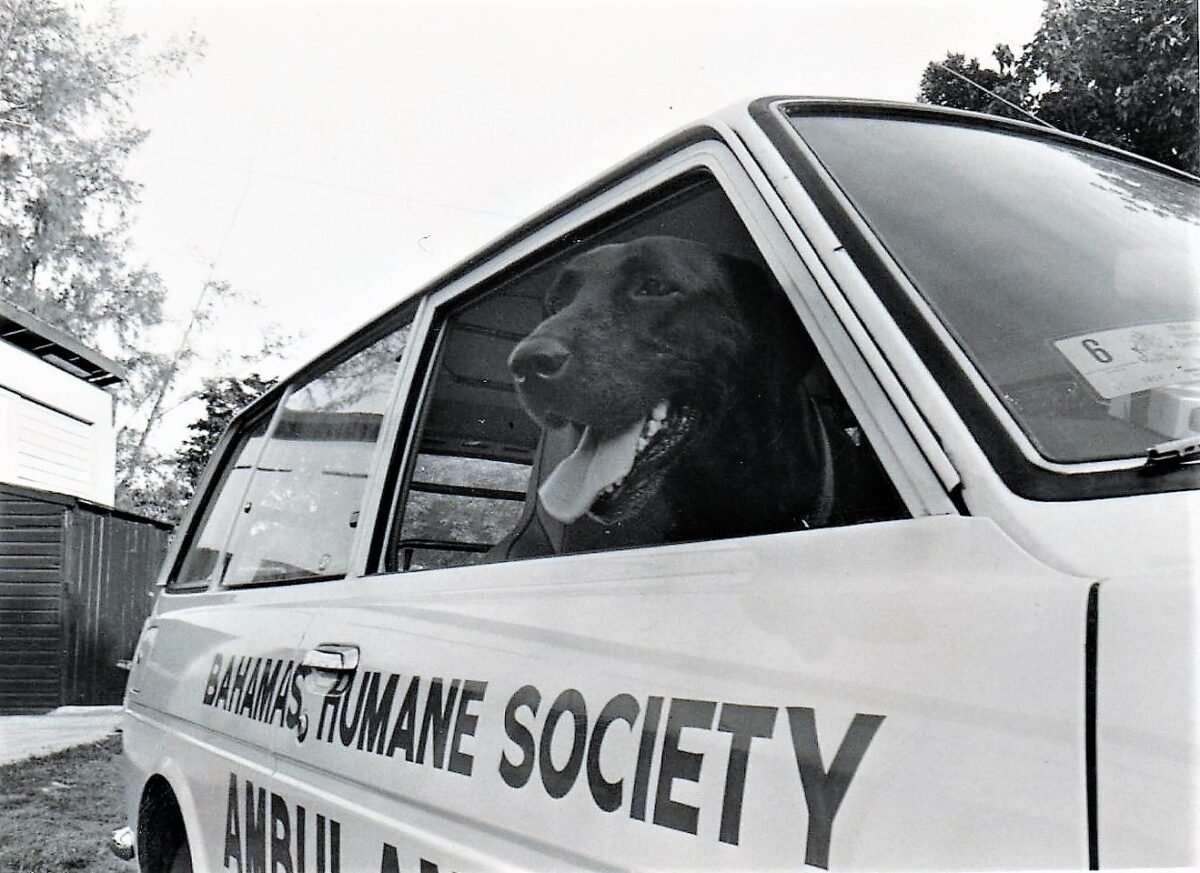A tribute to a faithful Bahamian rescue dog named Condor who kept me safe and sane.
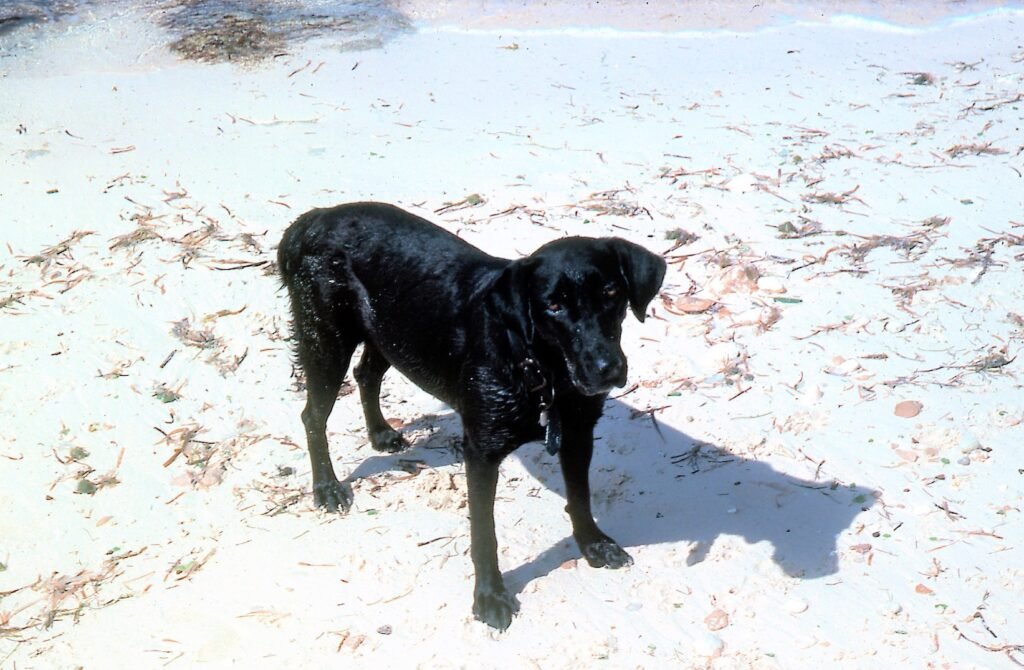
In September 1975 I found myself sitting in a bungalow beside the Bahamas Humane Society compound in Nassau having just arrived on an arduous flight from the UK to take up the position of chief inspector. As often happens in these situations when you are exhausted and suddenly find yourself alone far from home, what seemed a good idea at the time was now losing its appeal and I was full of misgiving as to whether I was up to the task.
It was at this point that the back door into the kitchen, which I had left ajar, was pushed open and I was just thinking that I couldn’t face any further welcoming visitors when I heard the tapping of nails on the tiled floor and a sleek black female padded nonchalantly into the sitting room. She had the appearance of a crossbreed black Labrador and had a three-inch excuse for a tail probably nipped off when a puppy.
A special relationship was born
She stood in the doorway staring at me with soulful eyes. I waited to see if an owner appeared, but she was alone, and after a few seconds, emboldened by my non-committal reaction, she walked further into the room flopped onto the cool tiled floor and made herself comfortable. There was no attempt to come over to introduce herself and although I made polite conversation with her, it was obvious I was being thoroughly scrutinized as though a great decision was being made. I watched her and she stared at me and from that moment on she never left my side during the time of my residence and a special relationship was born.
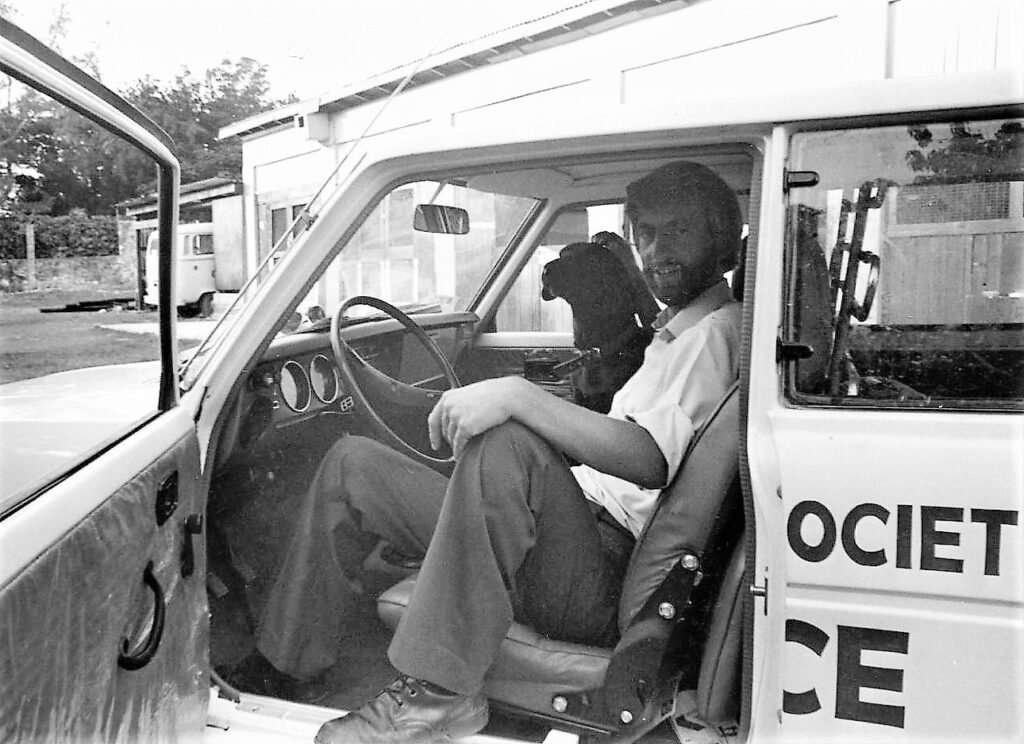
I had no idea who owned her, what her name was or where she had come from, but on that first evening I was extremely glad of her company and she appeared happy to listen to all my concerns. Although it was only our first date, she stayed the night lying across the doorway to the bedroom as though instinctively on guard. In the weeks and months that followed I found she was a dog with attitude and several bad habits but a real darling when you got to know her. It proved to be a case of role reversal with her adopting me rather than the other way round.
Condor was my permanent shadow
I discovered next day that her name was Condor and that she was technically one of the “yard dogs” but it seemed that she was a lady quick to change allegiances when the fancy took her, and possibly spotted a relationship with better opportunities. I was unable to move or go anywhere without her being my permanent shadow, and on occasions she proved a good protector and I was pleased to have her by my side. She came out on all my work visits, social visits (she hated missing a party) and even insisted on coming to the drive-in movie although she would sleep through the film on the back seat. She was also very vain and hated being left out of a photograph and always found a way to muscle her way in.

My most precious times with her were when we patrolled the island together speeding to incidents and singing along to the radio. Like all dogs she adored hanging her head out of the passenger window and she liked it even more when I would occasionally stop at a sheltered deserted beach and allowed her to swim or chase or retrieve a bit of driftwood. She loved the sea, a true water dog, but it played havoc with her ears causing regular infections and irritations which I had to treat, but I didn’t have the heart to restrict her favourite pleasure.
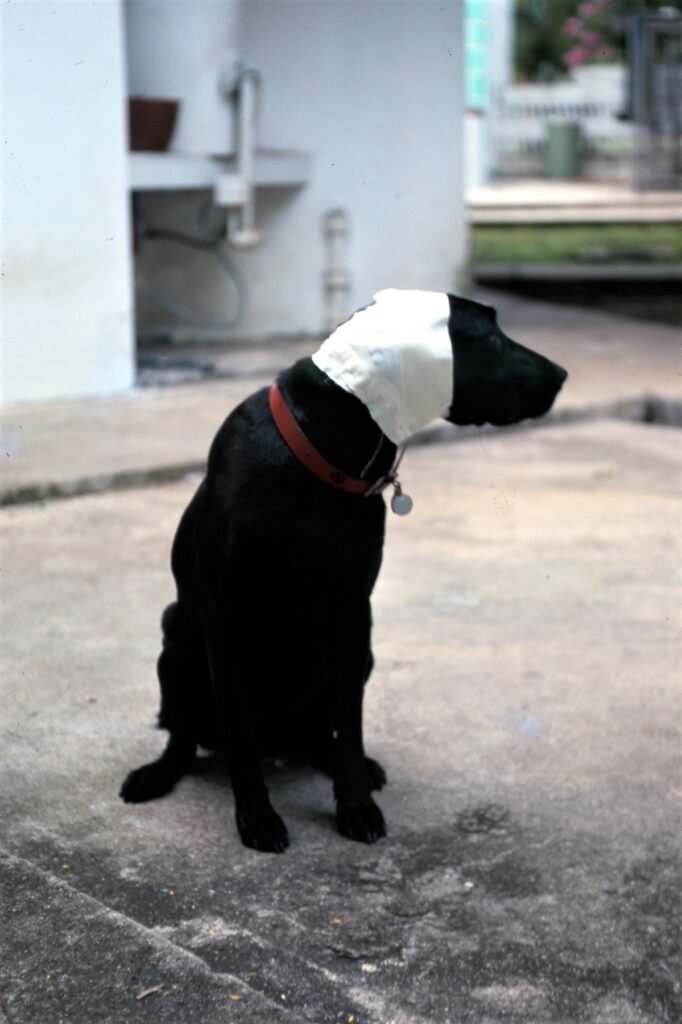
Condor loved spending our time off on Paradise Island beach.
We both enjoyed our downtime together particularly my weekly afternoons off when we usually went to the western end of Paradise Island beach which in the 1970’s was often deserted (no Atlantis, Club Med or marina at that time) and we swam and snorkelled. We finished the day with a stroll to the lighthouse and back when she would trot in front with a piece of driftwood firmly lodged in her mouth. I enjoyed snorkelling, but Condor had difficulty understanding the concept and all I could ever see was her four legs thrashing back and forth in front of me often ramming me and tipping me over. It was a time to escape all the stress and trauma of my challenging work for a while and it was extremely idyllic.
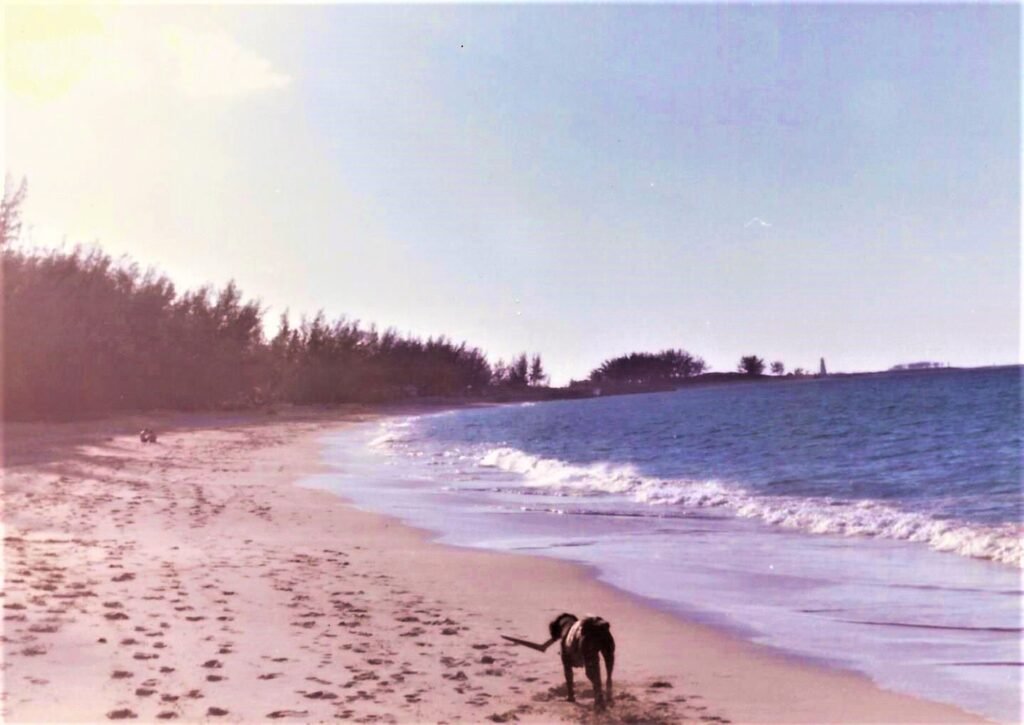
She did come with many bad habits though, her most worrying being her dislike of certain Bahamian men wearing straw hats which was quite a problem in sunny and hot Nassau. It may have been a throwback from some earlier event of ill treatment. I discovered this aversion the hard way while snoozing one afternoon on Paradise Island beach when she rudely woke me by kicking sand in my face as she hurtled off growling menacingly. By the time I lifted my head she was chasing a poor terrified man in a straw hat out to sea. By the time I got to her, the frazzled man had completed a nifty 30-yard swim out to sea leaving his straw hat floating on the water. I apologized profusely to him and half-heartedly admonished my bodyguard, but from that moment on I had to shout a warning to any man in straw hat that crossed our path and quickly restrain her.
Her stomach would often worryingly bloat to the size of a beach ball
Her other problems included severe flatulence mainly caused by pigging any food material she came across either fresh or decomposing. Her stomach would often worryingly bloat to the size of a beach ball to the point of exploding and she would lie on a cold floor moaning. But she never learned the lesson and wherever we went, her search for edibles was always her focus. My long-suffering friends, when I was invited to dinner parties, were very tolerant of the occasional stench emanating from wherever she lay and to their credit carried on conversing without pause.

She also had the less than endearing hobby of either eating or rolling in horse manure and as I spent a lot of time dealing with abandoned and ill-treated horses, she had plenty of opportunity. I tried in vain to stop this habit to no avail, but fortunately her rolling preference was for dried dung which was easy to brush off her. At every opportunity she would squirm on her back while uttering groans of ecstasy and having shouted at her she would always accept the scolding in good spirit and carry on. But her penchant for eating fresh dung was a no-no and I did have to stop her in her
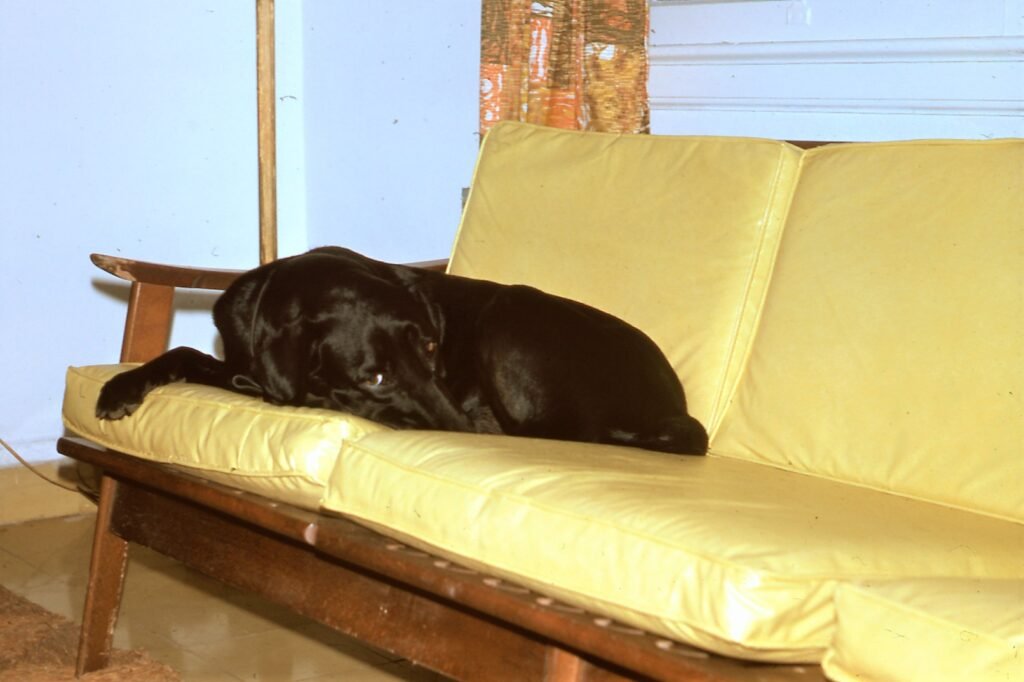
First thing every morning I had a routine of touring the Humane Society compound and clinic inspecting the animals and Condor insisted on and enjoyed accompanying me. She would watch me pick up my keys from the kitchen table and grab my mug of tea (I am English after all) and she would lazily heave herself up, stretch and make sure she was out the door before me with her stump of a tail wagging enthusiastically. She liked these early morning walkabouts as it gave her a chance to meet and greet the animals and more importantly search out any discarded or uneaten food.
Our day would then start, and we would have no idea what to expect not that Condor cared as long as she was along for the ride. I enjoyed patrolling the island attending incidents and stopping off at local villages to chat to residents about their complaints and worries over animals. Condor particularly loved speeding to emergencies sometimes with my blue light flashing and she enjoyed leaning from side to side as we turned corners at speed. (I was also a district constable in the Royal Bahamian Police Force (RBPF) so allowed to do it. Condor liked children and the attention she got from them which was a bonus for me when on school visits. She became a mascot, a favourite with the children who would wave at her as we drove past with her head out of the window benignly accepting the adulation.

We had three vehicles two of which were Volkswagens with bench seats and obviously Condor always wanted the window seat which wasn’t a problem unless I had a colleague with me. Then there was a lot of pushing and jostling to make her sit in the middle of us. Even if you managed this, she would lean heavily against you or lean over and drool while standing painfully on your groin until you gave up and let her have her own way. Then with the seating arrangements organized we could get under way. She often tried to pre-empt this problem by getting into the vehicle we were going to use before we arrived (she cleverly knew which one it was as we usually left the doors open to air it out) and we would play a rotten trick on her by getting into a different one.

My work often placed me in sticky situations. On many occasions I was threatened with a knife, cutlass, broken bottle or aggression, but the presence of Condor barking and growling and the implied threat of letting her out of the vehicle often had a calming effect on the situation. It was a bluff on my part as I would never have put her in danger, but I discovered there was a certain amount of black dog syndrome on the island or a wariness of dogs of that ilk. I am sure that having her as a sidekick prevented me from receiving serious injury and gave me confidence which I was always grateful for.
Near the end of my tenure I reached a point where work overload and dealing with chronic animal cruelty and suffering started to take a toll on my emotional and physical well-being. This coincided with my personal car being stolen which put me into debt because it was not insured for theft and relations with my employers deteriorating to an exceptionally low ebb. One evening I just walked out of the house totally depressed and in a daze not knowing where I was going with Condor tagging along as always.
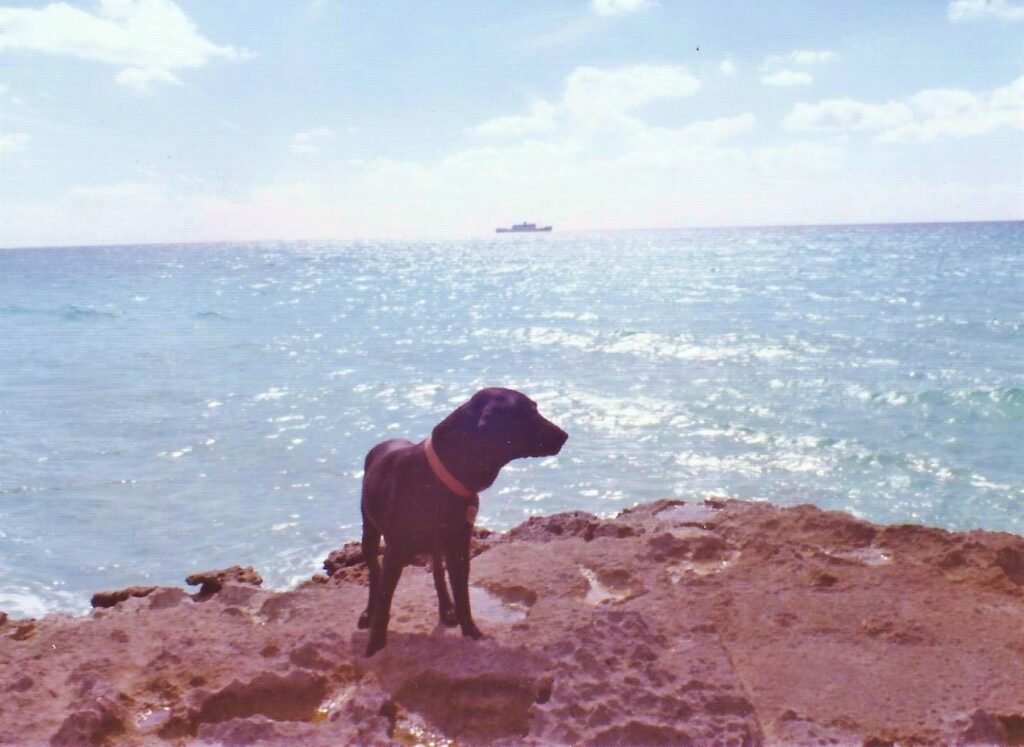
I eventfully found myself sitting on a deserted Saunders beach a mile or so from home watching the sun go down and crying my eyes out with a concerned Condor leaning against me. She did her best to cheer me up with little success, so eventually she sauntered to the water’s edge, grabbed a piece of wood, came back and threw it at my feet. She returned to the water and barked encouragingly until I got up, smiled and started throwing it in the water for her. For some strange reason my mood miraculously improved and it seemed she was trying to say that life was just a beach so let’s forget everything else and just get on with it. And we did.
Coinciding with this I was offered out of the blue an extremely interesting job back in the UK and decided for the sake of my sanity I could not pass it up. Immediately my main concern was what to do about Condor. I cannot explain how reliant and emotionally connected I was to her at that juncture and to leave her behind was unthinkable. I owed her so much as I know I could not have survived my time in the Bahamas without her.
At the time dog quarantine had just been introduced in the UK under new Rabies Laws (which coincidently I was about to enforce in my new job at Heathrow Airport) and I knew that she would have to undergo six months solitary confinement in a kennel. She was not a young dog and was accustomed to so much freedom and life in a hot climate. I wasn’t sure it would be fair to take it all away from her, but I didn’t think I could give her up as we had formed such an incredible bond, so I started applying for the required import license and quarantine space.
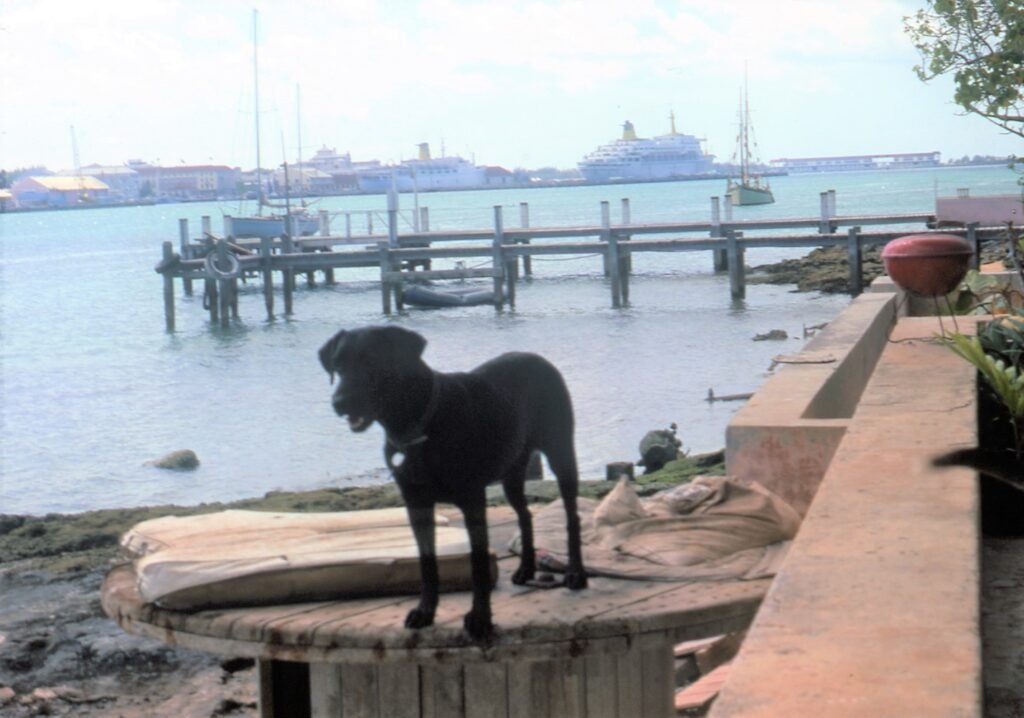
A heart wrenching decision.
She needed a clean bill of health and the Society veterinarian volunteered to do all the necessary tests. It was at this point that he gave me the devastating news that she was suffering from the latter stages of untreatable heartworm even though she was not showing any outward symptoms. He advised that it would be unfair and selfish to put her through such a traumatic journey and change of lifestyle when her days were numbered. I was heartbroken at having to make the terrible decision to leave her behind, but everyone promised to look after her for me and she would remain as the Society mascot.
I shall never forget my day of departure when she trotted out to the car with me and sat by my side with an enquiring look. I had tried to say my last emotional goodbyes to her in my house but gave her a last cuddle. As we drove away, I looked back to see her sitting in the middle of the car park with a resigned look on her face and I was absolutely devastated.
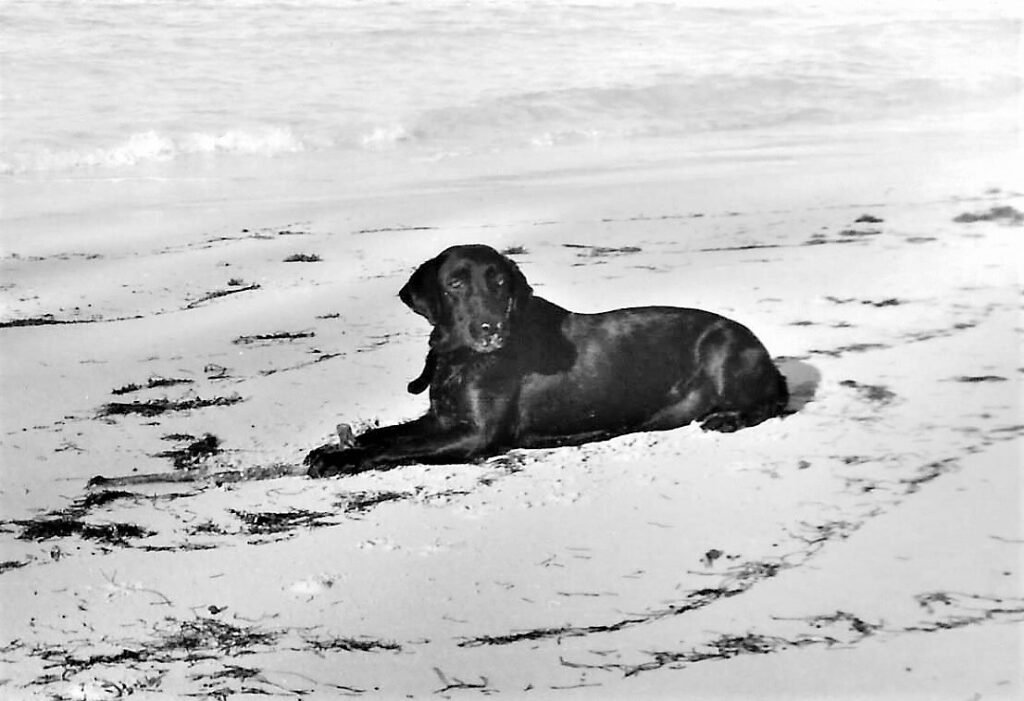
Postscript.
I kept in touch and was informed that she soon settled into her old routine. She survived another eighteen months and I did see her again on a return visit a year later but kept my distance and I was pleased to see that she appeared happy with life. She was an amazing dog and I talk often of her particularly when I see a black Labrador on a beach with a red collar, which is often.
